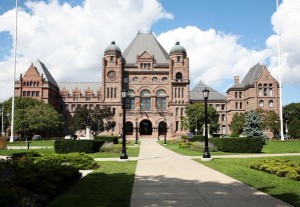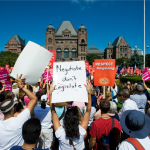Educational workers fight back against government
 Educational workers have become the main target for the provincial government’s austerity agenda. Even before the provincial budget was announced, it had been decided educational workers would have to settle for a’net zero’collective agreement. After the debacle of Bill 115, the government came up with Bill 122, an Act respecting collective bargaining in Ontario’s school system. Since the end of August, the province, provincial teacher federations and the Ontario Public School Board Association (OPSBA) have been negotiating locally and provincially. Not surprisingly, bargaining has hit an impasse and educational workers are battling back.
Educational workers have become the main target for the provincial government’s austerity agenda. Even before the provincial budget was announced, it had been decided educational workers would have to settle for a’net zero’collective agreement. After the debacle of Bill 115, the government came up with Bill 122, an Act respecting collective bargaining in Ontario’s school system. Since the end of August, the province, provincial teacher federations and the Ontario Public School Board Association (OPSBA) have been negotiating locally and provincially. Not surprisingly, bargaining has hit an impasse and educational workers are battling back.
A little history is necessary to understand educational workers’ frustration with the provincial government and its attempt to reduce the deficit on the backs of educational workers. Previously, Bill 115 was a law giving the provincial government extraordinary abusive powers that they used a couple of years ago, to unilaterally impose conditions and take away previously agreed rights. The government, through Bill 115, was able to deduct $1.2 billion dollars from its staggering deficit by taking away (contract stripping, or strips) previously agreed to rights. Legal challenges are now going through the courts re: Bill 115 and the abuse of collective bargaining rights.
Bill 122 was then promoted as a better way to negotiate and a template to encourage success for collective agreements between the province and federations.
However, this bill has proven to be utterly confusing with negotiations taking place at two levels, the provincial and the local level. Add to the bargaining table a third party OPSBA, and one needs a program to decide who is bargaining for what. Despite the confusion, using Bill 122 as a template, negotiations have been on-going since September 2014.
Amazingly, one of the snags in achieving a negotiated collective agreement has been the make-up of classes. More students in each class are now considered okay by the government. Once considered the cornerstone of this provincial government’s education policy, class size has become a major impediment. Shockingly the government has flip-flopped on this policy because they certainly did not run this as an election platform. Astoundingly, OPSBA too, believes more students in a classroom, with fewer support workers, will have no effect on student achievement. Sadly, it appears the only achievement that truly matters is the amount of money spent on educational workers. The implied message is that the educational workers will make the system work no matter how underfunded, and more importantly understaffed, it may become.
Specifically being isolated and targeted by the provincial government’s austerity agenda has raised concerns among educational workers. Educational workers do not begrudge the provincial OPP raise of roughly eight per cent but ask the question; why are we not receiving similar treatment? It has been noted the OPP is very much a male-oriented profession, whereas the educational workers are very much a female-oriented profession. Is government policy sexist? Certainly, the argument can be made.
After having negotiated rights taken away unilaterally (Bill 115), becoming the scapegoat for the provincial government’s inept financial decisions and deficit, and somehow becoming the isolated public sector targets, educational workers are fighting back. Nobody wants to be on strike. However, to simply accept strips from the government isn’t going to happen. Having dictated conditions to educational workers for their last ‘contract’, the government is trying to do it again.
Meanwhile, Liz Sandals, the education minister, is mystified and perplexed as to why the educational community is upset. Pretending to be bewildered is a strategy, but not necessarily a good one. Already two high school district school boards are walking the picket lines, Durham (Oshawa and area) and Rainbow (Sudbury). Next week Peel (Mississauga) may join in the rolling strikes. Meaningful negotiations need to be encouraged by Sandals before more strikes in Ontario begin. To do that, collective agreements need to be finalized through the bargaining process. Unfortunately, history suggests this may be difficult for Sandals and this government.
Ultimately, labour unrest is avoidable with fair negotiated agreements, but not all sides, particularly this provincial government are willing to make Bill 122 work.
The Belleville Intelligencer
Wed Apr 29 2015
Section: Editorial/Opinion
Byline: COLIN MACKAY
Osprey Media Group Inc.


